 On Friday, U.S. District Court Judge Robert L. Pitman is scheduled to hear oral arguments on Texas' new anti-abortion law, S.B. 8 in the federal government's Emergency Motion for a Temporary Restraining Order or Preliminary Injunction [PDF]. He is likely to rule in favor of the federal government.
On Friday, U.S. District Court Judge Robert L. Pitman is scheduled to hear oral arguments on Texas' new anti-abortion law, S.B. 8 in the federal government's Emergency Motion for a Temporary Restraining Order or Preliminary Injunction [PDF]. He is likely to rule in favor of the federal government.
If granted, the ruling by Judge Pitman, an Obama appointee, would temporarily prevent enforcement of the new Texas statute banning pre-viability abortions performed on or after 6 weeks of pregnancy, before many women even know they are pregnant. That preliminary injunction would, for now, restore the status quo ante --- the state of the law in Texas prior to Sept. 1, 2021, when S.B. 8 first went into effect.
Unless overturned on appeal, the preliminary injunction would then remain in effect pending a final decision on the legal issues raised by the U.S. Department of Justice (DOJ) in the federal Complaint it filed in United States v. Texas.
The issuance of a temporary injunction by Judge Pitman would not be inconsistent with the U.S. Supreme Court's recent 5-4 rejection of a private medical provider's similar request for an injunction in Whole Woman's Health v. Jackson, the initial federal challenge to the Lone Star State's new law.
As the DOJ argues in its filing, no one, not even Texas, contends that S.B. 8's pre-viability abortion ban --- one that also contains no exception for unwanted pregnancies due to rape or incest --- is Constitutional under existing federal law. To the contrary, even in the first case, Whole Women's Health, the right-wing Supreme Court majority conceded the medical provider plaintiff "raised serious questions regarding the constitutionality of the Texas law at issue".
The core problem which prevented the issuance of an injunction in the initial case arose from "uncertainties" both as to federal court jurisdiction and whether any of the named defendants in that case could lawfully be the subject of a federal court injunction.
Those "uncertainties" arose because S.B. 8 was specifically designed to prevent challenges to its constitutionality in federal courts. The statute was crafted to prevent the Executive Branch of state government from enforcing the 6-week abortion ban. Instead, according to the DOJ's Complaint, S.B. 8 "deputized ordinary citizens to serve as bounty hunters who are statutorily authorized to recover $10,000 per claim from individuals who facilitate a woman's exercise of her constitutional rights."
In Whole Woman's Health, a legal concept known as State sovereign immunity prevented the plaintiff from naming Texas as a defendant. Because the statute prevents enforcement of the Act by members of the state's Executive Branch, the private medical provider was unable to seek an injunction against anyone working for that branch of the Lone Star State. There's legal uncertainty as to whether the State court judge, who was a named defendant in the case, could be enjoined by a federal court. The only potential private "bounty hunter" named in the medical provider's complaint filed an affidavit with the U.S. Supreme Court, asserting he had no present intent to file an S.B. 8 enforcement lawsuit.
The Supreme Court's "shadow docket" majority decision held that those "uncertainties" warranted a denial of the private medical provider's request for injunctive relief in Whole Women's Health. However, that same majority expressly noted their decision "in no way limits other procedurally proper challenges to the Texas law."
Texas cannot assert sovereign immunity when it is directly sued by the federal government in a case that alleges a State enactment violates the sovereignty of the United States. Thus, the DOJ's case, United States v. Texas, is a "procedurally proper" challenge...


 Sunday 'Golden Age' Toons
Sunday 'Golden Age' Toons Global Health Menace Becomes U.S. Health Chief; Also: DOJ's Thursday Afternoon Massacre: 'BradCast' 2/13/25
Global Health Menace Becomes U.S. Health Chief; Also: DOJ's Thursday Afternoon Massacre: 'BradCast' 2/13/25 'Green News Report' 2/13/25
'Green News Report' 2/13/25
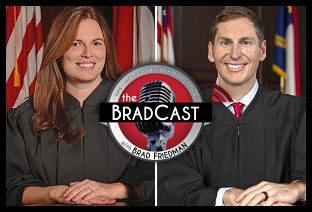 2024's Last Unsettled Race:
2024's Last Unsettled Race: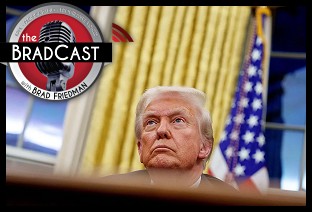 'Very Dire': Ethics Expert on Trump's Golden Age of Corruption: 'BradCast' 2/11/25
'Very Dire': Ethics Expert on Trump's Golden Age of Corruption: 'BradCast' 2/11/25 'Green News Report' 2/11/25
'Green News Report' 2/11/25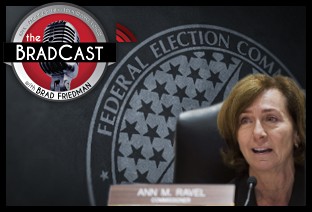 'Insane': Former FEC Chair on Trump's Firing of Current FEC Chair: 'BradCast' 2/10/25
'Insane': Former FEC Chair on Trump's Firing of Current FEC Chair: 'BradCast' 2/10/25 Sunday 'Bye American' Toons
Sunday 'Bye American' Toons Trump/Musk 'Shutdowns' You Haven't Heard as Much About: 'BradCast' 2/6/25
Trump/Musk 'Shutdowns' You Haven't Heard as Much About: 'BradCast' 2/6/25 'Green News Report' 2/6/25
'Green News Report' 2/6/25 'Two-State Solution -- State of Confusion and State of Chaos': 'BradCast' 2/5/25
'Two-State Solution -- State of Confusion and State of Chaos': 'BradCast' 2/5/25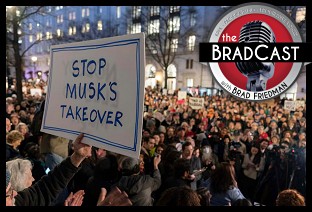 The Opposition Takes Shape: 'BradCast' 2/4/25
The Opposition Takes Shape: 'BradCast' 2/4/25 'You're Not Overwhelmed. You're Under Attack.': 'BradCast' 2/3/25
'You're Not Overwhelmed. You're Under Attack.': 'BradCast' 2/3/25 The BRAD BLOG is Now 21 and Over!
The BRAD BLOG is Now 21 and Over!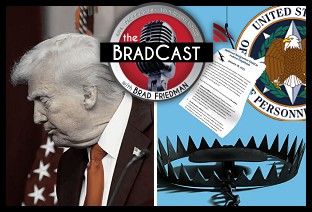 Trump/Musk 'Buyout' Offer an 'Unlawful, Barely Veiled Threat': 'BradCast' 1/30/25
Trump/Musk 'Buyout' Offer an 'Unlawful, Barely Veiled Threat': 'BradCast' 1/30/25 'They Know They're Lying': Fossil Fuel's War on Science, Humanity: 'BradCast' 1/29/25
'They Know They're Lying': Fossil Fuel's War on Science, Humanity: 'BradCast' 1/29/25 Trump Attempts to Usurp Congressional Budget Authority: 'BradCast' 1/28/25
Trump Attempts to Usurp Congressional Budget Authority: 'BradCast' 1/28/25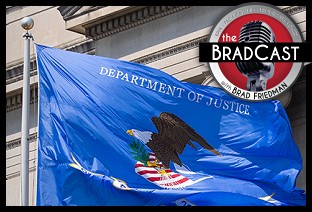 Trump Massacres Begin at DOJ, I.G. Offices: 'BradCast' 1/27/25
Trump Massacres Begin at DOJ, I.G. Offices: 'BradCast' 1/27/25
 VA GOP VOTER REG FRAUDSTER OFF HOOK
VA GOP VOTER REG FRAUDSTER OFF HOOK Criminal GOP Voter Registration Fraud Probe Expanding in VA
Criminal GOP Voter Registration Fraud Probe Expanding in VA DOJ PROBE SOUGHT AFTER VA ARREST
DOJ PROBE SOUGHT AFTER VA ARREST Arrest in VA: GOP Voter Reg Scandal Widens
Arrest in VA: GOP Voter Reg Scandal Widens ALL TOGETHER: ROVE, SPROUL, KOCHS, RNC
ALL TOGETHER: ROVE, SPROUL, KOCHS, RNC LATimes: RNC's 'Fired' Sproul Working for Repubs in 'as Many as 30 States'
LATimes: RNC's 'Fired' Sproul Working for Repubs in 'as Many as 30 States' 'Fired' Sproul Group 'Cloned', Still Working for Republicans in At Least 10 States
'Fired' Sproul Group 'Cloned', Still Working for Republicans in At Least 10 States FINALLY: FOX ON GOP REG FRAUD SCANDAL
FINALLY: FOX ON GOP REG FRAUD SCANDAL COLORADO FOLLOWS FLORIDA WITH GOP CRIMINAL INVESTIGATION
COLORADO FOLLOWS FLORIDA WITH GOP CRIMINAL INVESTIGATION CRIMINAL PROBE LAUNCHED INTO GOP VOTER REGISTRATION FRAUD SCANDAL IN FL
CRIMINAL PROBE LAUNCHED INTO GOP VOTER REGISTRATION FRAUD SCANDAL IN FL Brad Breaks PA Photo ID & GOP Registration Fraud Scandal News on Hartmann TV
Brad Breaks PA Photo ID & GOP Registration Fraud Scandal News on Hartmann TV  CAUGHT ON TAPE: COORDINATED NATIONWIDE GOP VOTER REG SCAM
CAUGHT ON TAPE: COORDINATED NATIONWIDE GOP VOTER REG SCAM CRIMINAL ELECTION FRAUD COMPLAINT FILED AGAINST GOP 'FRAUD' FIRM
CRIMINAL ELECTION FRAUD COMPLAINT FILED AGAINST GOP 'FRAUD' FIRM RICK SCOTT GETS ROLLED IN GOP REGISTRATION FRAUD SCANDAL
RICK SCOTT GETS ROLLED IN GOP REGISTRATION FRAUD SCANDAL VIDEO: Brad Breaks GOP Reg Fraud Scandal on Hartmann TV
VIDEO: Brad Breaks GOP Reg Fraud Scandal on Hartmann TV RNC FIRES NATIONAL VOTER REGISTRATION FIRM FOR FRAUD
RNC FIRES NATIONAL VOTER REGISTRATION FIRM FOR FRAUD EXCLUSIVE: Intvw w/ FL Official Who First Discovered GOP Reg Fraud
EXCLUSIVE: Intvw w/ FL Official Who First Discovered GOP Reg Fraud GOP REGISTRATION FRAUD FOUND IN FL
GOP REGISTRATION FRAUD FOUND IN FL



















 If there's one guy you really don't want vowing to dog you, it may be Rhode Island's Democratic Sen. Sheldon Whitehouse, easily one of the most persistent Senators in the upper chamber. If you're Trump's FBI Director or, especially, Supreme Court Justice Brett Kavanaugh, that's probably not good news. But it's just one of the stories covered on today's
If there's one guy you really don't want vowing to dog you, it may be Rhode Island's Democratic Sen. Sheldon Whitehouse, easily one of the most persistent Senators in the upper chamber. If you're Trump's FBI Director or, especially, Supreme Court Justice Brett Kavanaugh, that's probably not good news. But it's just one of the stories covered on today's  As Desi notes on today's
As Desi notes on today's  In the short term, the U.S. government can and should compel all citizens, other than those for whom the COVID vaccines
In the short term, the U.S. government can and should compel all citizens, other than those for whom the COVID vaccines  Democracy, politics and death. Ya know, just another day on
Democracy, politics and death. Ya know, just another day on 







 We've got quite a bit of 'Clean up on Aisle 45' news on today's
We've got quite a bit of 'Clean up on Aisle 45' news on today's  Prepare to be outraged by some gobsmacking and maddening numbers from today's guest on
Prepare to be outraged by some gobsmacking and maddening numbers from today's guest on  We've got mostly democracy-related stories to report on today's
We've got mostly democracy-related stories to report on today's  Unlike Microsoft Windows, says our guest on today's
Unlike Microsoft Windows, says our guest on today's  As Washington State's Democratic Senator Maria Cantwell suggested last week, the phony GOP uproar over Rep. Deb Haaland (D-NM)'s nomination by Joe Biden to become the first Native American Secretary of the U.S. Interior Department is a 'proxy fight' over something else entirely. It might be over the dim future for fossil fuels. It might be over the fact that Haaland would be the first indigenous cabinet member for any Presidential Administration in U.S. history. Or it might be the fact that the GOP, without any real governing philosophy or values, is simply flailing to find relevance. We discuss all of the above with our guest on today's
As Washington State's Democratic Senator Maria Cantwell suggested last week, the phony GOP uproar over Rep. Deb Haaland (D-NM)'s nomination by Joe Biden to become the first Native American Secretary of the U.S. Interior Department is a 'proxy fight' over something else entirely. It might be over the dim future for fossil fuels. It might be over the fact that Haaland would be the first indigenous cabinet member for any Presidential Administration in U.S. history. Or it might be the fact that the GOP, without any real governing philosophy or values, is simply flailing to find relevance. We discuss all of the above with our guest on today's 
 Plummeting COVID rates and FDA approval of a brand new, one-shot vaccine seem like very good news! And it is...if it weren't for our propensity to screw it all up again, as our guest on today's
Plummeting COVID rates and FDA approval of a brand new, one-shot vaccine seem like very good news! And it is...if it weren't for our propensity to screw it all up again, as our guest on today's  On today's
On today's  As life in the U.S. continues to get grimmer, we find a few much-needed points of light during today's
As life in the U.S. continues to get grimmer, we find a few much-needed points of light during today's 













